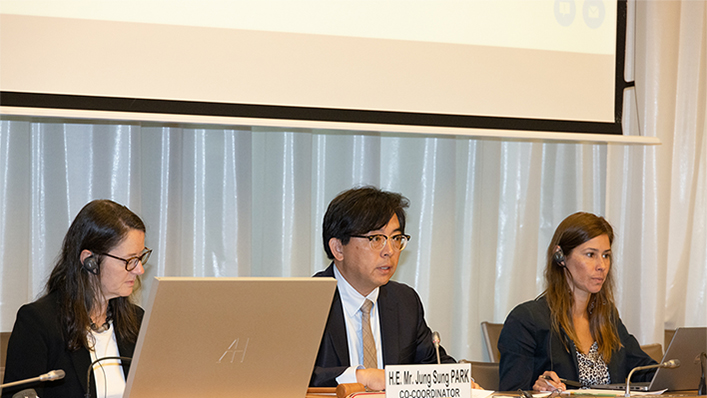
An open-ended plenary meeting on 3 November wrapped up the consultations held by members in different configurations the previous two days. The consultations allowed delegations to discuss the eighth revision of the “Easter text”, circulated to all WTO members on 31 October, which includes an up-to-date annex revealing that several text proposals had been either dropped by their proponents or considerably streamlined.
The co-coordinator of the negotiations, Ambassador Jung Sung Park of the Republic of Korea, emphasized the progress achieved at this negotiating round. He stressed that four important provisions had been moved from text proposals in the annex to so-called “plain text” — namely, the part of the negotiating document that contains the provisions on which a significant degree of convergence among participants could be achieved.
Ambassador Park underlined that this did not imply that these provisions constituted agreed text, as nothing was agreed until everything was agreed. The four provisions concern the definition of “Authorization”, “Supplier Development Programmes” and “Home State Measures”, and a provision on the relationship between the future IFD agreement and existing WTO agreements, to be included under “Final Provisions”.
The definition of “Authorization” to pursue investment activities is key to defining the scope of Section III on “Streamlining and speeding up administrative procedures”.
The provision on “Supplier Development Programmes”, which was submitted by a least developed country (LDC), aims at fostering sustainable development. More specifically, members are encouraged, where appropriate and in a manner consistent with their legal systems and their international trade and investment obligations, to implement programmes that strengthen the capabilities of local suppliers. This is especially aimed at micro, small, and medium-sized enterprises (MSMEs) so that they can meet supply demands from foreign investors.
The provisions on “Home State Measures” encourage those members that have in place laws or regulations to facilitate outward investment to make them publicly available, including through electronic means. They also encourage members to share experiences and information on such measures in the future Committee on Investment Facilitation.
Next meetings
The next two rounds of meetings will take place on 23-25 November and 14-16 December. These meetings will be hybrid, with delegates attending in-person and online, keeping the same configuration as previous rounds. Ambassador Park encouraged delegations and capital-based experts to attend these meetings in-person to increase engagement and momentum.
“The objective of the next meetings is to continue resolving and cleaning up all remaining issues, with a view to arriving at a single, stabilized text, paving the way for us to reach our shared goal of concluding the text negotiations by the end of this year,” he said.
Background
Member-driven, transparent, inclusive and open to all WTO members, the joint initiative on investment facilitation for development includes more than 110 members (two-thirds of the WTO membership) — up from the 70 members who endorsed the Joint Ministerial Statement on Investment Facilitation for Development launched at the 11th Ministerial Conference held in December 2017 in Buenos Aires.
A second Joint Statement on Investment Facilitation for Development was issued on 22 November 2019, with 98 members expressing support for the 2017 Joint Ministerial Statement.
Share
Reach us to explore global export and import deals